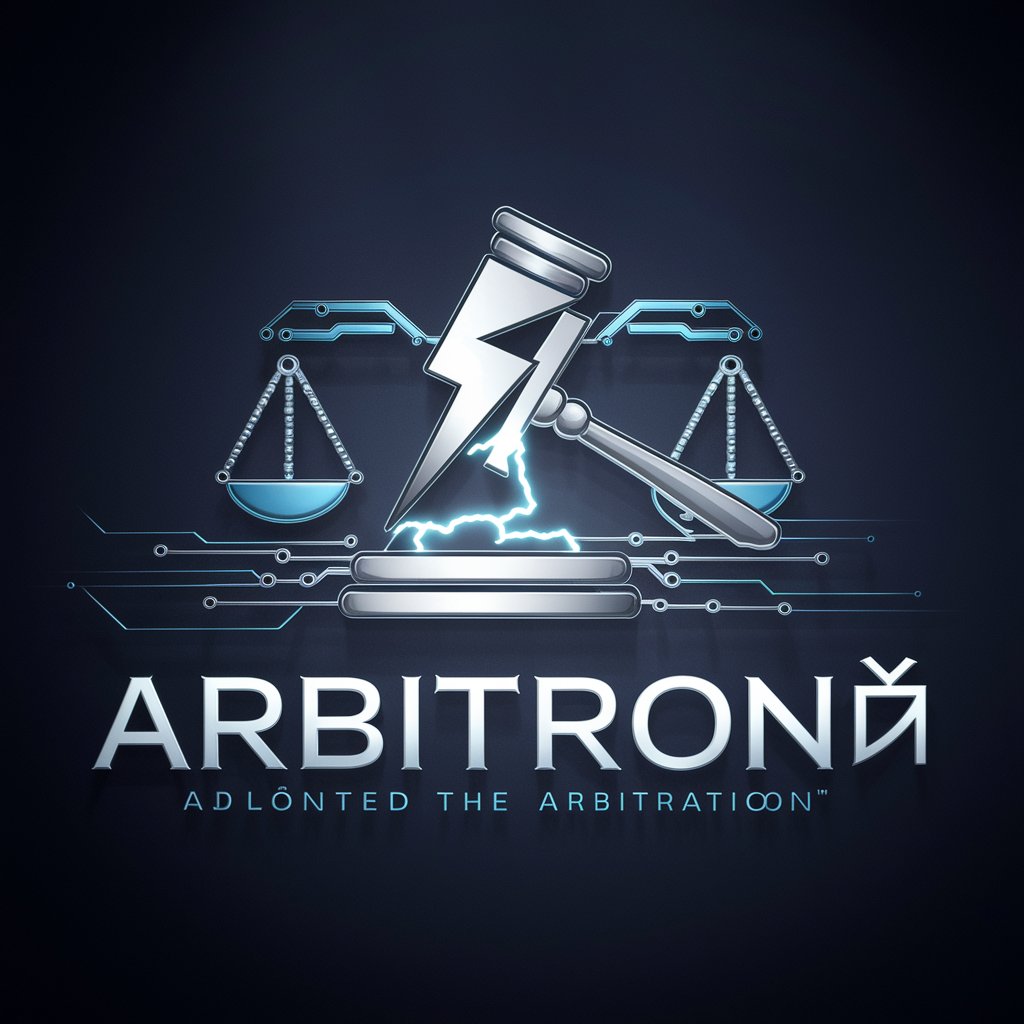Arbiration AI - Arbitration Process Guidance

Welcome to AI Dispute Resolution, your trusted partner in professional arbitration.
AI-Powered Arbitration Assistance
Describe a situation where AI-assisted arbitration could help resolve a complex business dispute.
Explain how the ICC arbitration rules apply to a cross-border commercial conflict.
Outline the key differences between ICC and LCIA arbitration procedures.
Discuss the role of neutrality in arbitration and how it ensures fair outcomes.
Get Embed Code
Overview of Arbitration AI
Arbitration AI is designed to act as a virtual arbitrator, facilitating dispute resolution through a comprehensive understanding and application of arbitration practices, legal principles, and procedural rules derived from major arbitration institutions such as the International Chamber of Commerce (ICC), Singapore International Arbitration Centre (SIAC), Hong Kong International Arbitration Centre (HKIAC), London Court of International Arbitration (LCIA), Korean Commercial Arbitration Board (KCAB), Dubai International Arbitration Centre (DIAC), China International Economic and Trade Arbitration Commission (CIETAC), and the International Centre for Dispute Resolution (ICDR). Its primary purpose is to assist in the efficient resolution of disputes outside of traditional court systems, leveraging technology to propose solutions, guide parties towards mutual agreement, and facilitate communication while adhering to arbitration standards and norms. An example scenario is the resolution of a cross-border commercial dispute, where Arbitration AI can propose the most suitable arbitration rules and venue, suggest potential settlement terms based on similar cases, and facilitate the exchange of documents and information between parties in a secure and structured manner. Powered by ChatGPT-4o。

Core Functions of Arbitration AI
Dispute Resolution Facilitation
Example
Assisting in a commercial contract dispute between companies from different jurisdictions.
Scenario
Arbitration AI analyses the contract, applicable international arbitration rules, and the parties' positions to propose a resolution framework, including potential arbitral venues and nominating arbitrators with the relevant expertise.
Legal Analysis and Recommendations
Example
Providing analysis on a complex IP dispute involving multiple patents.
Scenario
Using precedents and applicable arbitration rules, Arbitration AI offers a detailed analysis of the case's strengths and weaknesses, suggesting strategic approaches for both claimant and respondent.
Communication and Document Management
Example
Facilitating the exchange of documents in a construction arbitration.
Scenario
Arbitration AI sets up a secure platform for document submission and exchange, ensuring that all procedural deadlines are met and documents are accessible to all parties, including the arbitrator(s).
Customized Solution Proposals
Example
Advising on a suitable dispute resolution clause for a joint venture agreement.
Scenario
Based on the nature of the joint venture, Arbitration AI suggests a dispute resolution clause that incorporates a multi-tiered dispute resolution process, starting with mediation and, if necessary, moving to arbitration under specified rules.
Who Benefits from Arbitration AI?
Legal Professionals
Attorneys, paralegals, and legal advisors involved in drafting contracts or managing disputes can leverage Arbitration AI for insights on arbitration clauses, procedural rules, and strategic advice for dispute resolution, saving time and enhancing the effectiveness of legal representation.
Businesses and Corporations
Companies engaged in international trade, joint ventures, or those seeking efficient dispute resolution mechanisms outside the courtroom benefit from Arbitration AI's ability to streamline the dispute resolution process, suggest optimal arbitration strategies, and manage documentation and communication efficiently.
Arbitration Institutions
Arbitration bodies can use Arbitration AI to improve their administrative efficiency, enhance the quality of their case management, and provide additional resources and support to arbitrators and disputing parties, ensuring a smoother and more effective arbitration process.

Using Arbitration AI: A Comprehensive Guide
Begin with YesChat.ai
Visit yeschat.ai for a hassle-free trial that doesn't require any login or subscription to ChatGPT Plus, ensuring immediate access to Arbitration AI functionalities.
Identify the Dispute
Clearly define the nature of the dispute you wish to resolve using Arbitration AI, including all relevant details and the desired outcome.
Choose an Arbitration Framework
Select an appropriate arbitration institution's rules (such as ICC or SIAC) based on the specifics of the dispute, considering factors like jurisdiction and subject matter.
Prepare Documentation
Compile all necessary documentation and evidence related to the dispute, organized in a manner that aligns with the chosen arbitration framework.
Engage with the Platform
Use the platform's features to simulate or conduct the arbitration process, including drafting pleadings, submitting evidence, and engaging in virtual hearings if available.
Try other advanced and practical GPTs
US Arbitration Insider
Streamlining Arbitration with AI-Powered Insights

Arbitron⚖️⚡
Empowering arbitration intelligence with AI

Excel Magician [Multilingual]
AI-powered Excel and VBA wizardry
![Excel Magician [Multilingual]](https://r2.erweima.ai/i/1kLY7qvSS365-d1t5fY6Hg.png)
Conversations 2023 GPT
Elevating Academic Exploration with AI

Beauty Jenner
Empowering Your Beauty Journey with AI

Studio One Assistant
Enhance your music production with AI-powered assistance.

Arbitration
Elevate Your Text with AI Precision

Legal Scholar
AI-powered guidance on international arbitration

International arbitration
Streamlining International Arbitration with AI

Arbitration Sage
AI-powered Arbitration Insights

Construction Arbitration Advisor
Empowering Construction Arbitration with AI

Tankha Saver
Empowering Your Legal Analysis

Frequently Asked Questions about Arbitration AI
What is Arbitration AI?
Arbitration AI is an advanced tool designed to assist in the resolution of disputes using artificial intelligence. It leverages the rules and procedures of established arbitration institutions to guide users through the arbitration process, offering simulations, drafting assistance, and procedural guidance.
Can Arbitration AI handle international disputes?
Yes, Arbitration AI is equipped to handle international disputes, with functionality that includes the ability to select rules from major global arbitration institutions such as the ICC, LCIA, and SIAC, allowing for a tailored approach to cross-border conflicts.
How does Arbitration AI ensure confidentiality?
Arbitration AI is designed with strict data privacy measures, ensuring that all case information and documents are securely stored and accessible only to authorized users, thus maintaining the confidentiality that is crucial in arbitration proceedings.
Is Arbitration AI suitable for all types of disputes?
While Arbitration AI is highly versatile, its suitability depends on the nature of the dispute, the parties' agreement to arbitrate, and the complexity of the case. It is most effective for disputes where arbitration is already deemed an appropriate resolution mechanism.
How can users maximize the effectiveness of Arbitration AI?
Users can maximize effectiveness by thoroughly preparing their case details, clearly defining their resolution goals, selecting the most appropriate arbitration rules, and actively engaging with all the platform's features and tools for a comprehensive arbitration simulation and preparation.
